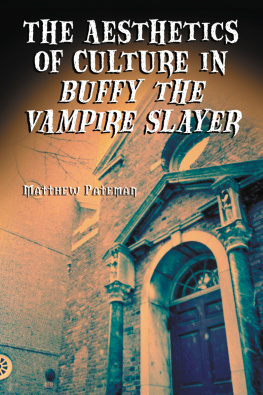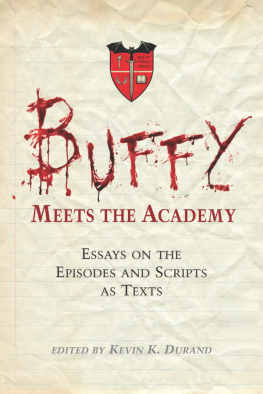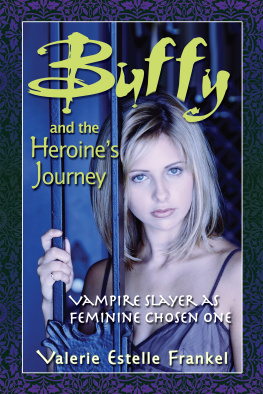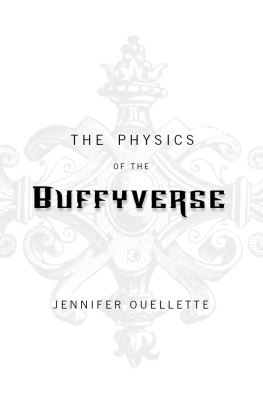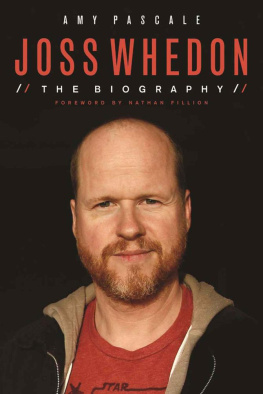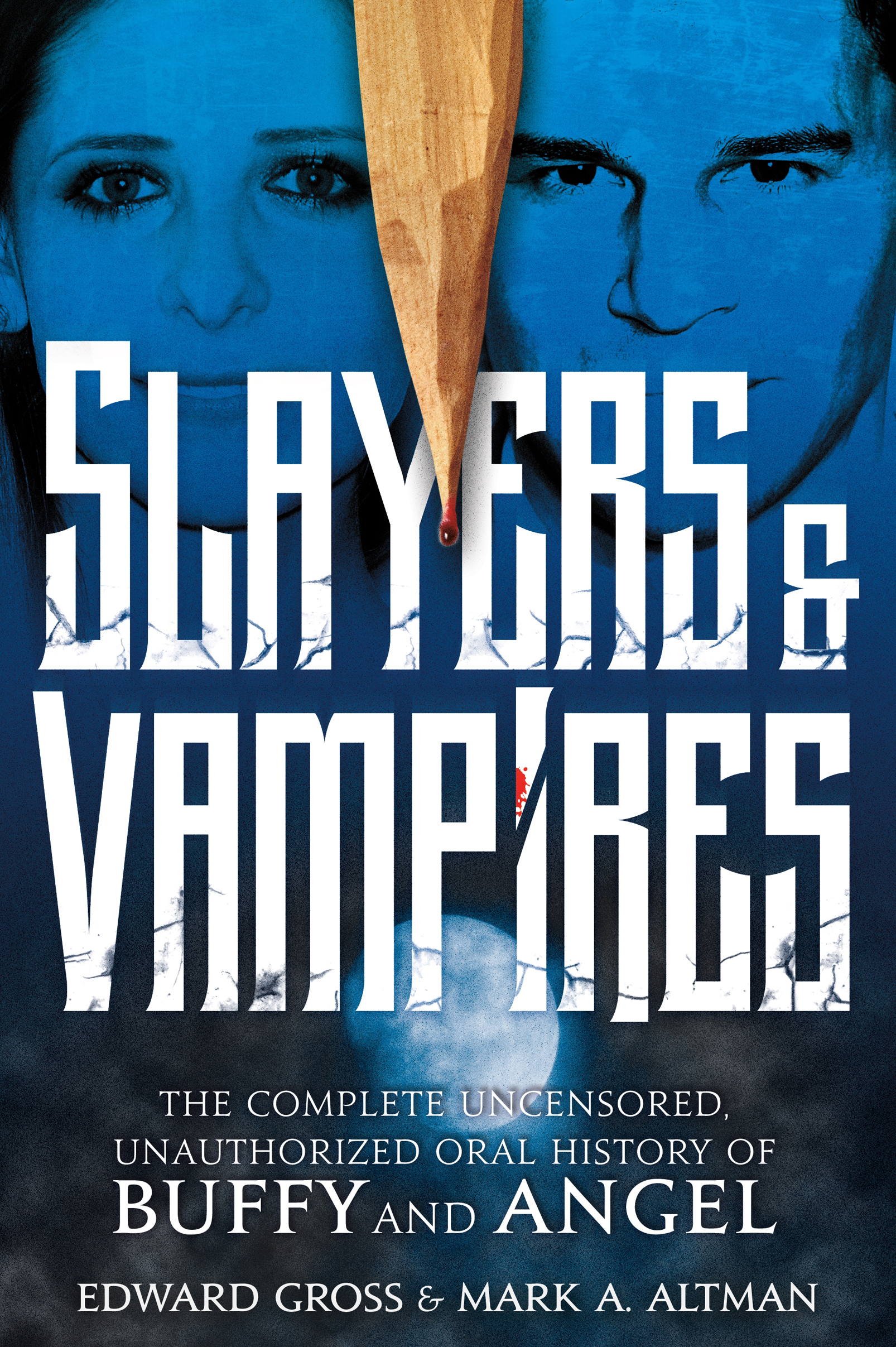Contents
Guide
Pagebreaks of the print version

The author and publisher have provided this e-book to you without Digital Rights Management software (DRM) applied so that you can enjoy reading it on your personal devices. This e-book is for your personal use only. You may not print or post this e-book, or make this e-book publicly available in any way. You may not copy, reproduce, or upload this e-book, other than to read it on one of your personal devices.
Copyright infringement is against the law. If you believe the copy of this e-book you are reading infringes on the authors copyright, please notify the publisher at: us.macmillanusa.com/piracy.
FROM MARK A. ALTMAN
Dedicated to the West Coast Altman Family cats Giles and Willow (and, of course, our not-so-sweet Ripley, who recently left us, presumably to fight aliens on LV-426. We miss you!).
And especially my wife and Sunnydale High graduate, Naomi Altman . She saves my world a lot.
Also, my future Slayer, Ella Altman, and Watcher in training, Isaac Altman. (Although he does his fair share of watching right now with Star Wars and Star Trek . Ah, the classics.)
Thank you to my wonderful grandfather and inspiration, the late Seymour Isserson, for being the first published author in the family. Still on that road to self-improvement.
Special thanks to the original Gentleman, our editor Brendan Deneen , who never tells us to Hush (though no doubt hes sorely tempted).
And the word-count slayer, my partner in crime, coauthor, and jocular journalist Edward Gross . Nobody does it better makes me feel sad for the rest.
And finally, Ken Wahl and Jonathan Bank s , because Wiseguy still rules! (Right, Dad!?!)
FROM EDWARD GROSS
Dedicated first and foremost to my wife and best friend, Eileen, whos been slaying me for over thirty years (in the best possible way).
To my little Angels, Teddy, Dennis, and Kevin.
To my daughter-in-law, Lindsay, who went from Potential to the real deal.
To Mark A. Altman, for being such a great collaborator and friend.
Shes cool. Shes hot. Shes tepid. Shes all-temperature Buffy.
BY Mark A. Altman
Make no mistake, Joss Whedon is a god.
Not a Zeus-like god who hurls thunderbolts from the sky and demands sacrifices of goats, chickens, geese, and the occasional vestal virgin, but an honest-to-goodness writing deity, a wizard of words, a maestro of the macabre and liege of letters. Not to mention hes far more partial to plaid button-downs than togas. But, not unlike Vargas on the receiving end of a spear gun from 007, you get the point (or Mr. Pointy, in his case). If that fact got lost on us during his less-than-halcyon days, when Whedon wrote for the mouthy Roseanne and Dan, resurrected Alien, or even when he debuted the first Buffy, who failed to slay audiences on movie screens in 1992, by now it should be abundantly clear to those of us fortunate enough to have been hip to the oeuvre of Joss Whedon, this is a man of boundless creativity, thoughtfulness, passion, intelligence, and wit.
Are you not entertained?
In a medium and a genre in which sexy blond girls were cannon fodder for the creepy-crawlies that go bump and slash in the night, Whedon flipped the script. Instead of being the prey, the lithe little blond girl with the silly name was the predator, keeping the troubled town of Sunnydale safe from all manner of nefarious and apocalyptic threats to her friends and family, from points north, west, south, and east. Its been said before but its worth reiterating that Buffy didnt take place in the high school world of a John Hughes comedy; it used its supernatural trappings as a metaphor for the challenges and pain of adolescence. Not many of us could relate to growing up in a small town terrorized by soulless vampires, goblins, and ghouls, but most can relate to stories of unrequited love (or lust), sexy and soulful mysterious strangers, insular high school cliques, and cheerleaders whose bodies are possessed by their obsessed mothers. OK, not so much that last one.
High school drama had come a long way since Glenn Ford in The Blackboard Jungle . And what makes Buffy so unique is that it stands as perhaps one of the last vestiges of a more innocent age of adolescence, before social media and iPhones. When Buffy was created, it was still the era of creaking plot mechanics that could hinge on a missed ring on the landline phone, and in which the only social network in a town like Sunnydale was hanging out at a place like the Bronze while listening to music from a procession of great to middling 90s bands. Buffy was delivering its swan song to the more innocent days of high school just as the first glimmers of social networking were arriving on the scene with Friendster (remember that short-lived precursor to Myspace and Facebook?). Buffy would be a very different show today: the denizens of Sunnydale would be snapchatting and tweeting about Mayors transforming into giant lizard gods and hellish Halloween celebrations. For gods sakes, stay away from Ethans and lay off the Band Candy. Is that more than 140 characters?
Meanwhile, Whedons spin-off of Buffy, Angel, is a miraculous story of survival against all odds. The series debuted with David Boreanazs titular vampire as Philip Marlowe lite attempting to redeem himself on the mean streets of the City of Angels in a ham-fisted, noir-tinged detective drama. Sputtering for nearly half a season, the show began to find its own distinct identity, miraculously and brilliantly reinventing itself several times, first when Cordelia was bequeathed the visions of the late Glenn Quinns Doyle, and then when Angel Investigations took up residence in an abandoned art deco hotel, and, finally, when Angel and company would find themselves in charge of the evil law firm Wolfram & Hart. What was stunning was that despite the seemingly inane, high-concept TV Guide descriptionAngel, the vampire with a soul, is forced to run an evil law firm in Los Angeles (redundant, to be sure)the shows dramatic reinvention for its fifth season was a home run, and, much like Next Generation s darker, more brooding spin-off Deep Space Nine, Angel often outshone its progenitor, despite having a smaller audience and receiving far less critical acclaim.
Embracing a more serialized structure than its progenitor, Angel required a more serious commitment from viewers of the pre-DVR age, who would be amply awarded for their loyalty (although I vaguely recall purchasing my first TiVo around that time, and I still have my plush Mr. TiVo to prove it). As Buffy began sputtering to its inevitable conclusion, Angel continued to evolve, culminating in one of the great series finales of all time, a supernatural Godfather denouement, a cliffhanger that is, regrettably, unlikely ever to be resolved. Not since Mike Torello and Ray Luca grappled violently in the cockpit of a rapidly descending Cessna in the second-season capper of Crime Story had a series left you hungering for more as the axe swung.
And since the respective conclusions of Buffy and Angel, Whedon has continued to amass quite the filmography (a subject for another book, surely). He rarely repeats himself and, no matter how disparate the material, marks his work with a singular style and wit. Even without Joss Whedons name in the opening credits, itd be hard to miss his unique imprimatur on such a diverse array of film and television as 2002s Firefly, the addictive, short-lived cult sci-fi Western about a ragtag group of underdogs and misfits long before Guardians of the Galaxy made such things en vogue, and 2012s The Avengers, featuring a distinctly different band of underdogs and misfits who save the world and transformed Whedon from a revered cult figure to a bankable blockbuster film director, all while he knocked out the microbudget adaptation of Shakespeares Much Ado About Nothing, a charming and delightful retelling of the Bards whimsical comedy, which gets a very Whedonesque makeover and was shot in his backyard. He made the film on a shoestring between Hammer time and Hulk busting. Doesnt this man sleep? Apparently not.


